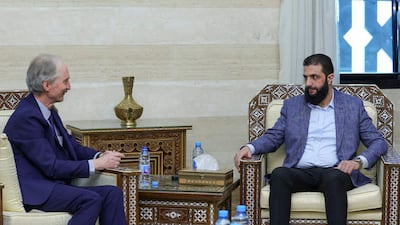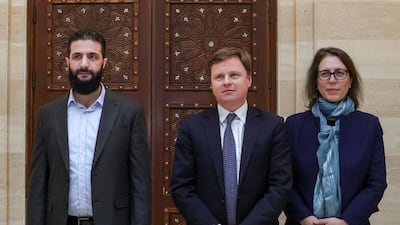When Jonathan Powell was announced as Britain’s next national security adviser a month ago, Syria's President Bashar Al Assad's power seemed secure.
However, by the time Mr Powell stepped into the job, the Syrian dictator had fled, to be replaced by an interim arrangement led by Hayat Tahrir Al Sham (HTS) which was formerly affiliated with Al Qaeda. Initial concerns over how to work with the group appear to be easing.
Britain’s warming relations with Syria and HTS leader Ahmad Al Shara could make Mr Powell’s job considerably easier as he takes the lead on Downing Street’s foreign policy.
The National understands that events are moving at pace, with Britain looking to press ahead in removing HTS’s terrorist proscription early in the new year.
If the group shows it can govern fairly, then the UK will almost certainly restore its embassy in Damascus for the first time since it closed its operations in 2013.
“This is about a legitimate transition government and part of that is obviously about inclusivity,” a western official said. “It's about ending violence and securing chemical weapons.”

An insight into the British government’s position towards the evolving situation in Syria is provided in Mr Powell's book Talking to Terrorists, written after negotiating Northern Ireland peace talks. His definition of terrorists as “non-state armed groups that enjoy significant political support” allows for significant wriggle room.
HTS appears to fit this definition, which is perhaps an indication of why the British government has opened up talks with its leader.
Following the meeting with two senior British Foreign Office officials on Monday, it is understood that Mr Al Shara asked for help in stopping Israeli air strikes “and getting them out of Syria” as well as assistance in lifting sanctions, The National was told.
Britain also put across the message that if the transitional government “does things the right way” then “we’re going to do what we can do to help you”, the official said.
Mr Al Shara is already seeking to smooth the path for engagement – and to be removed from the proscribed terrorist list – by his insistence on an inclusive government for Syria’s minorities.
His media presence was demonstrated in an interview with The Times in which he called for all sanctions to be lifted as they were “imposed on the flogger and the victim” arguing that “the flogger is gone now”.
The interview, in which he tried to assure western leaders that Syria would not be used as a launch pad for attacks on Israel, was shortly followed by a meeting with a British official.
In Monday’s meeting with director of the Middle East department Stephen Hickey and UK special representative to Syria Ann Snow, Mr Al Shara “spoke about the need to build a state of law and institutions, and establishing security”, Syrian state news agency Sana reported.
“He also spoke about Britain’s important role internationally,” it said.
With French and German officials expected to meet the HTS leader on Tuesday, it suggests a geopolitical shift has happened since Mr Al Assad’s downfall that could lead to western diplomatic relations reopening with Damascus.
Officials who have met HTS leader since ousting Bashar Al Assad – in pictures




In the background is the man Prime Minister Keir Starmer has employed to oversee foreign affairs and security policy. Mr Powell is someone who knows about both the successes and failures of rebuilding shattered or vulnerable states.
During his 10 years as chief of staff to then prime minister Tony Blair, Mr Powell experienced success followed by humiliation and failure.
Following the harrowing international diplomacy failures of the Rwanda genocide, in which one million perished, and the earlier Balkans crisis, the pair came to power vowing never again. Their approach evolved into the “liberal intervention” policy articulated in Mr Blair’s 1999 Chicago speech.
This resulted in a series of successful interventions in failing states from Kosovo to Sierra Leone and to unseating the Taliban in 2001 but then became a victim of its victories by impelling Mr Blair to support America’s invasion of Iraq.
The last throw of western liberal interventionism came in Libya in 2011, ending in chaos that lingers, despite Mr Powell being asked to help resolve it in 2014.
But Libya led to a deep reluctance among British, then American politicians to authorise intervention against Syria when Mr Al Assad bombed and gassed his own people in 2013.
From that maelstrom emerged ISIS, a group so extreme that very few believed that negotiations could be considered, except Mr Powell, who suggested that one day that would have to happen.

That may well still be the case and Mr Powell could well be the man for that job as ISIS has shown signs of resurgence in the last few weeks. But the more pressing task is to prevent Syria from sliding into the quagmire that marked the Iraq, Afghanistan and Libya experiences of western intervention.
As a middle-ranking military power, Britain’s armed forces still retain a degree of fortitude and coupled with its formidable intelligence services can still play a global role. Now might well be the time for Britain to help Syria towards stability.
With concerns abroad that the US could become more isolationist, plus France in political chaos and Germany in stasis, Britain remains virtually the last standing western power that has a government with the leeway to adopt controversial policies.
Mr Powell could well instigate these, likely acting in conjunction with Britain’s Gulf allies, and cement his reputation as one who achieves rather than aspires to do so.
As the Syria 2013 vote demonstrated, where Britain goes sometimes others, such as America, will follow. Mr Powell is set to remain true to his theory that talking is superior to isolation as a strategy and could rapidly manoeuvre his country into being in the lead of western powers to remove HTS’s terrorism tag.


